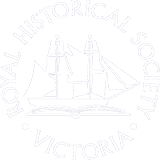
Blanche Ross-Watt. Image courtesy Gisborne & Mount Macedon Districts Historical Society Inc.
Blanche Muriel Eugene Ross-Watt (1861-1956)
Gisborne Councillor and Shire President
Blanche Muriel Eugene Hamilton was born at Gisborne on 4 January 1861. She was the seventh of eleven children of Thomas Ferrier Hamilton and Elizabeth Milner nee Stephen, who had married in Brighton in 1851. Her mother’s family was noted for their long involvement with the law, both in England and Australia, while her Scottish father had emigrated in 1839 with his cousin John Carre Riddell; both men settled on land in the Gisborne area. Her father was to serve on the Gisborne Council and as a member of the Victorian Legislative Council.
Initially educated on the family’s property, Elderslie, Blanche was sent to a finishing school at Hanover, Germany in 1882. In 1897, when 36, she married her neighbour and second cousin, 47-year-old Thomas Riddell Ross-Watt. Their only child, Catherine Elizabeth, known as Betty, was born in 1902. Blanche subsequently adopted German-born Elsa Sauer, perhaps as a companion for her own daughter. Like his father in law, Thomas also served on the Gisborne Council, before his death in 1919.
Blanche’s community involvements were many, including organising a Wattle Day event in 1912, which raised several thousand pounds for a children’s community hall in New Gisborne; and establishing a local branch of the Red Cross in 1914. She was described by her daughter as being
Never domesticated, save for her garden, and always happiest in community life …
Blanche decided in 1925 to stand for election to Gisborne Council, a logical progression of her interest in the local community. She successfully defeated two male candidates, becoming only the second woman (after Mary Rogers of Richmond Council) elected to a Council in Victoria. Two years later, she was one of the first woman JPs sworn in. In 1930 she revealed something of the pressures she had faced in running for Council:
Discouragement from her friends and something like resentment from local Councillors who have been in the habit of monopolising the Local Government Area, and did not approve seeing their cherished institution invaded by a woman.
In 1931 she was elected Shire President, the first woman to hold that position. In the following year, 1932, she attempted to attend a Levee at Government House to celebrate the King’s birthday, but was turned away as she was not a man. Her feelings were revealed at a subsequent Council meeting when the matter was raised:
If the Governor had any gumption about him, I think he would let women who hold positions like mine show their loyalty in the same way as men … I would not mind betting you that the Governor is forced to admit women next year. In these days of Communism it is time for women to come forward and say ‘I am going to show my loyalty. I don’t care a hang what the men think’.
In 1934 and again in 1938, she took nine months leave of absence from Council duties to travel overseas, examining local government matters in England and Europe during her travels.
She joined the Royal Historical Society of Victoria in 1936. Her membership was short, as she did not renew it in 1939. Perhaps this may have been because she was again elected Shire President, and her spare time would have been limited.
Blanche went on to serve her local council for 25 years, before retiring in 1950 at the age of 89. In stepping down she declared that ‘young people need something to do so I’m giving them the chance.’ She was made an Officer of the British Empire (OBE) in 1949, and died on 18 May 1956, aged 95. She left her estate, worth nearly £9,000, to her daughter Betty, apart from a bequest of £2,000 to Elsa Sauer.
Helen D. Harris
September 2021
Sources:
Australian Dictionary of Biography, Volume 16.
https://adb.anu.edu.au/biography/rosswatt-blanche-muriel-eugenie-11568
The right to vote; the right to stand. The involvement of women in local government in Victoria. Harris, Helen D. 2015.

 239 A'Beckett Street Melbourne, Victoria, 3000
239 A'Beckett Street Melbourne, Victoria, 3000  03 9326 9288
03 9326 9288  office@historyvictoria.org.au
office@historyvictoria.org.au  Office & Library: Weekdays 9am-5pm
Office & Library: Weekdays 9am-5pm

